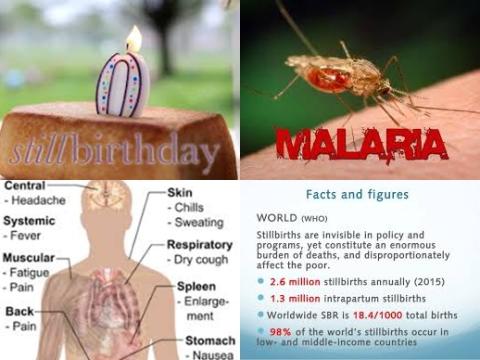
Objectives:
2-6 million stillbirths occur annually worldwide. The association between malaria in pregnancy and stillbirth has yet to be comprehensively quantified. Therefore, this review article (meta-analysis) has been conducted.
Does malaria in pregnancy increases stillbirth risk?
Study design:
This review article included 59 studies (population-based cross-sectional, cohort or case-control studies and randomised controlled trials, identified before Feb 28, 2017) consisting of 141,415 women and 3,387 stillbirths.
Results and conclusions:
The investigators found plasmodium falciparum malaria detected at delivery in peripheral samples significantly increased the risk of stillbirth with 81% [OR = 1.81, 95% CI = 1.42-2.30, I2 = 26.1%, 34 estimates].
The investigators found plasmodium falciparum malaria detected at delivery in placental samples significantly increased the risk of stillbirth with 95% [OR = 1.95, 95% CI = 1.48-2.57, I2 = 33.6%, 31 estimates].
The investigators found plasmodium falciparum malaria detected and treated during pregnancy was also associated with stillbirth, but to a lesser extent [OR = 1.47, 95% CI = 1.13-1.92, 19 estimates].
The investigators found plasmodium vivax malaria detected at delivery non-significantly increased the risk of stillbirth with 181% [OR = 2.81, 95% CI= 0.77-10.22, 3 estimates].
The investigators found plasmodium vivax malaria detected and treated during pregnancy non-significantly increased the risk of stillbirth with 9% [OR = 1.09, 95% CI= 0.76-1.57, 4 estimates].
The investigators found the association between plasmodium falciparum malaria in pregnancy and stillbirth was two times greater in areas of low-to-intermediate endemicity than in areas of high endemicity [OR = 1.96, 95% CI = 1.34-2.89].
The investigators concluded plasmodium falciparum malaria in pregnancy increases stillbirth risk. The risk of malaria-associated stillbirth is likely to increase as endemicity declines. There is a pressing need for context-appropriate, evidence-based interventions for malaria in pregnancy in low-endemicity settings.
Assuming all women with malaria are still parasitaemic at delivery, an estimated 20% of the 1,059,700 stillbirths in malaria-endemic sub-Saharan Africa are attributed to plasmodium falciparum malaria in pregnancy; the population attributable fraction decreases to 12%, assuming all women with malaria are treated during pregnancy.
Original title:
Quantification of the association between malaria in pregnancy and stillbirth: a systematic review and meta-analysis by Moore KA, Simpson JA, […], Fowkes FJI.
Link:
https://www.ncbi.nlm.nih.gov/pubmed/28967610
Additional information of El Mondo:
Find more information/studies on food fortification/malnutrition right here.
Malaria is a life-threatening disease and is caused by Plasmodium parasites. The parasites are spread to people through the bites of infected female Anopheles mosquitoes, called "malaria vectors". There are 5 parasite species that cause malaria in humans and 2 of these species - Plasmodium falciparum and Plasmodium vivax - pose the greatest threat.
- Plasmodium falciparum is responsible for the majority of malaria deaths globally and is the most prevalent species in sub-Saharan Africa. The remaining species are not typically as life threatening as Plasmodium falciparum.
- Plasmodium vivax, is the second most significant species and is prevalent in Southeast Asia and Latin America. Plasmodium vivax and Plasmodium ovale have the added complication of a dormant liver stage, which can be reactivated in the absence of a mosquito bite, leading to clinical symptoms.
- Plasmodium ovale represents only a small percentage of infections.
- Plasmodium malariae represents only a small percentage of infections.
- A fifth species Plasmodium knowlesi - a species that infects primates - has led to human malaria, but the exact mode of transmission remains unclear.
The time from the initial malaria infection until symptoms appear - incubation period - typically ranges from:
- 9 to 14 days for Plasmodium falciparum.
- 12 to 18 days for Plasmodium vivax and Plasmodium ovale.
- 18 to 40 days for Plasmodium malariae.
- 11 to 12 days for Plasmodium knowlesi.
Malaria is preventable and curable.